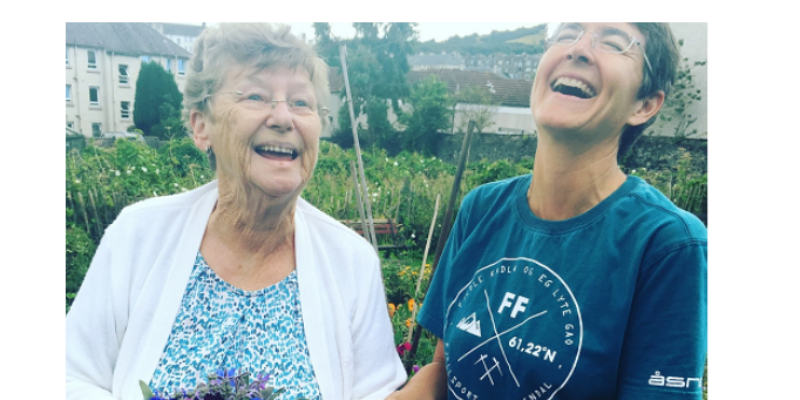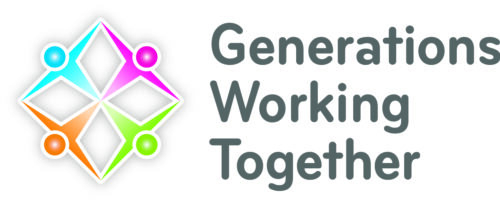
Intergenerational Prescribing
Generations Working Together (GWT) aims to connect people from different generations and backgrounds to share time and take part in opportunities in their communities that nurture and support younger and older people who often have skills and resources of considerable value to each other and share many areas of common concern. Bringing generations together can be done through social connections within groups, care homes, nurseries, local schools, colleges, and community groups as well as housing HUBS and libraries, there are no limits!
It’s about the ‘intentional’ act of building relationships that can help to alleviate isolation and loneliness across generations as well as breaking down barriers associated with ageism and stereotyping. Bringing generations together who may be living with long term conditions, poor mental health and focusing on what people can do with the right encouragement. One intergenerational project that benefitted both younger and older participants is The Snow Queen Intergenerational Project which brought together residents from Erskine Home and young people from a local school together who participated in workshops incorporating movement, storytelling, visual art, and music.
Feeling safe and sharing ideas
Health inequalities are measurable differences in standards of health (e.g., unfair differences in health within the population across social classes or between population groups and/or intersectionality). It is important that health and other inequalities are considered and addressed when planning to use an intergenerational approach. While health and social care systems are crucial for older people, numerous determinants of healthy and active ageing lie beyond the health system. Some of these influence older people directly, for example, living in a neighbourhood that is safe, where other people can be seen on the streets. Feeling safe encourages all people (older and younger) to engage more in their community.
However, addressing community safety and wellbeing must also consider the growing prevalence of external factors such as UK betting sites not on gamstop, which can negatively impact financial stability and mental health. These platforms often bypass regulatory safeguards, posing risks that disproportionately affect vulnerable populations.
Edinburgh Garden Partners is a good example of a gardening project that develops partnerships across generations and different backgrounds, between people who have called Edinburgh home their whole lives and those only recently arrived—including refugees. Most of the garden owners are older people, who tend to live in houses in the south side of the city. Their volunteers tend to be people living in tenements, or houses with more limited growing space.
Intergenerational practice provides a solution that can help to relieve isolation and involve people in community activities, contributing to improved general health and wellbeing. It can promote positive behaviours by sharing skills and creating safe environments for activities, exchanging life skills and experiences, and supporting communities that are safe to grow up and grow old in. The activities can be anything from sharing stories and getting to know others, gardening, sport, dancing, learning a new language, sharing heritage, sharing food, and more! The main ingredient is building connections and getting to know others from a different generation.
Intergenerational Quality Standards
The Covid-19 pandemic has shone a spotlight on inequalities and created a need for change. GWT make the case for developing an intergenerational approach to tackling health inequalities, using a cross-disciplinary approach, one of our Intergenerational quality standards across the third sector working collaboratively with different agencies to achieve the purpose of fair health across communities in Scotland.
Intergenerational solidarity
Additionally, ageist stereotypes, such as portraying older people as being a burden rather than a resource have very often led us to focus on short-term ways to minimise the cost of ageing rather than maximising opportunities for older people to contribute. We must support people to live long healthy lives, create more opportunities for younger and older workers, enable older people to remain active in society and build an age friendly environment. Younger and older people need to be regarded as part of the solution rather than being the problem. There is potential in bringing them together and Old’s Cool Digital Intergenerational Practice Toolkit is an excellent example of a toolkit co-designed with young people from the final Old’s Cool group, the toolkit aimed to share the learning of delivering digital intergenerational practice throughout the pandemic, which can support further remote connections and projects.
“The COVID-19 pandemic has had a devastating impact on older persons. Intergenerational solidarity must be a touchstone in our efforts to recover. Older persons have also made important contributions to the crisis response, as health workers and caregivers. Women, for instance, are over-represented among both older persons and among the paid and unpaid care workers who look after them” (WHO Report on Ageism)
Resources and Support
GWT provides training, network support, and resources to enable people see the value of intergenerational connections and to recognise the importance of these approaches for health and wellbeing. Membership is FREE for anyone living in Scotland. Here is a link to further reading Intergenerational Approaches to improving health & wellbeing.
Contact Bella for further information.
Bella Kerr is the Intergenerational Development Officer for Generations Working Together

